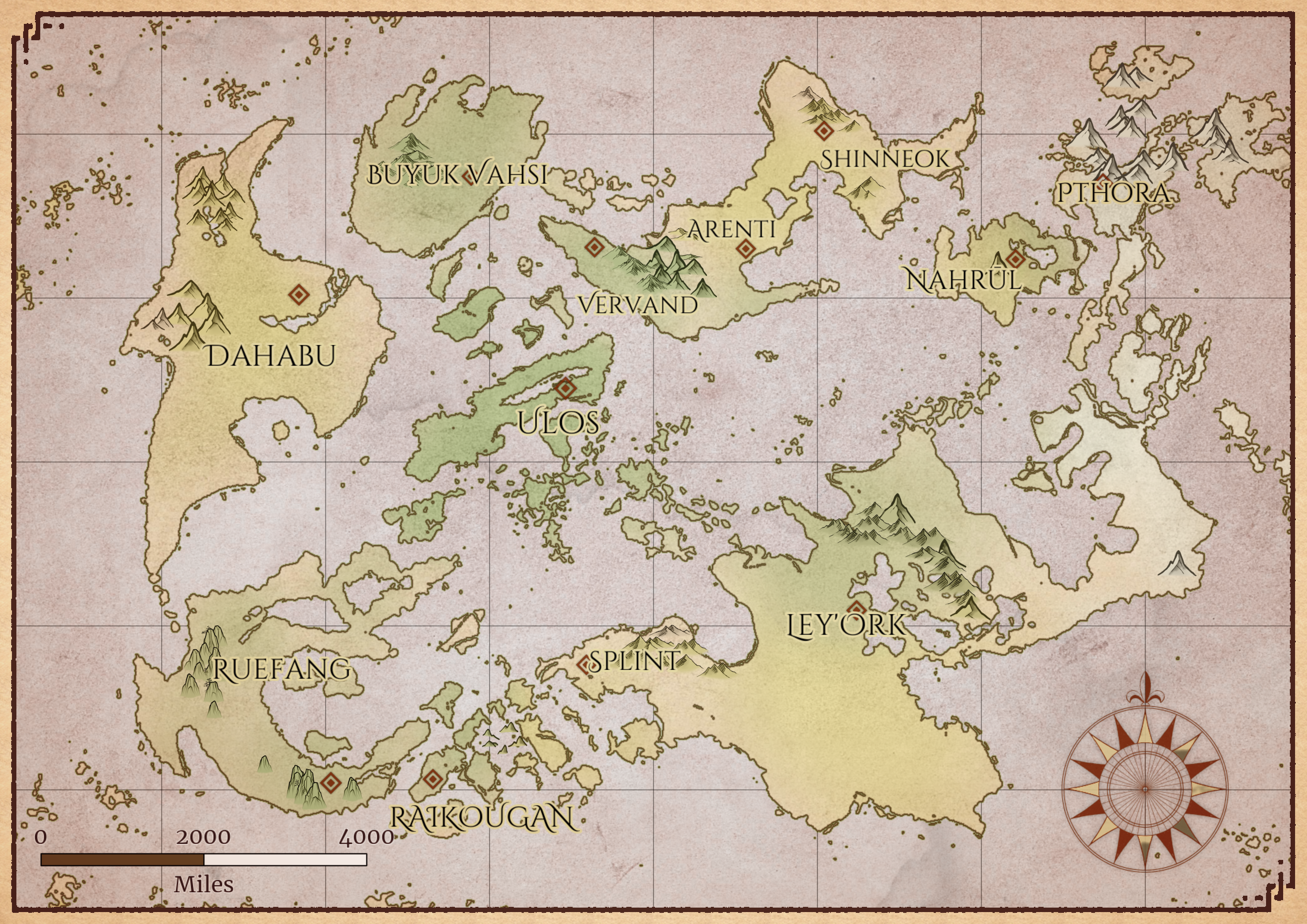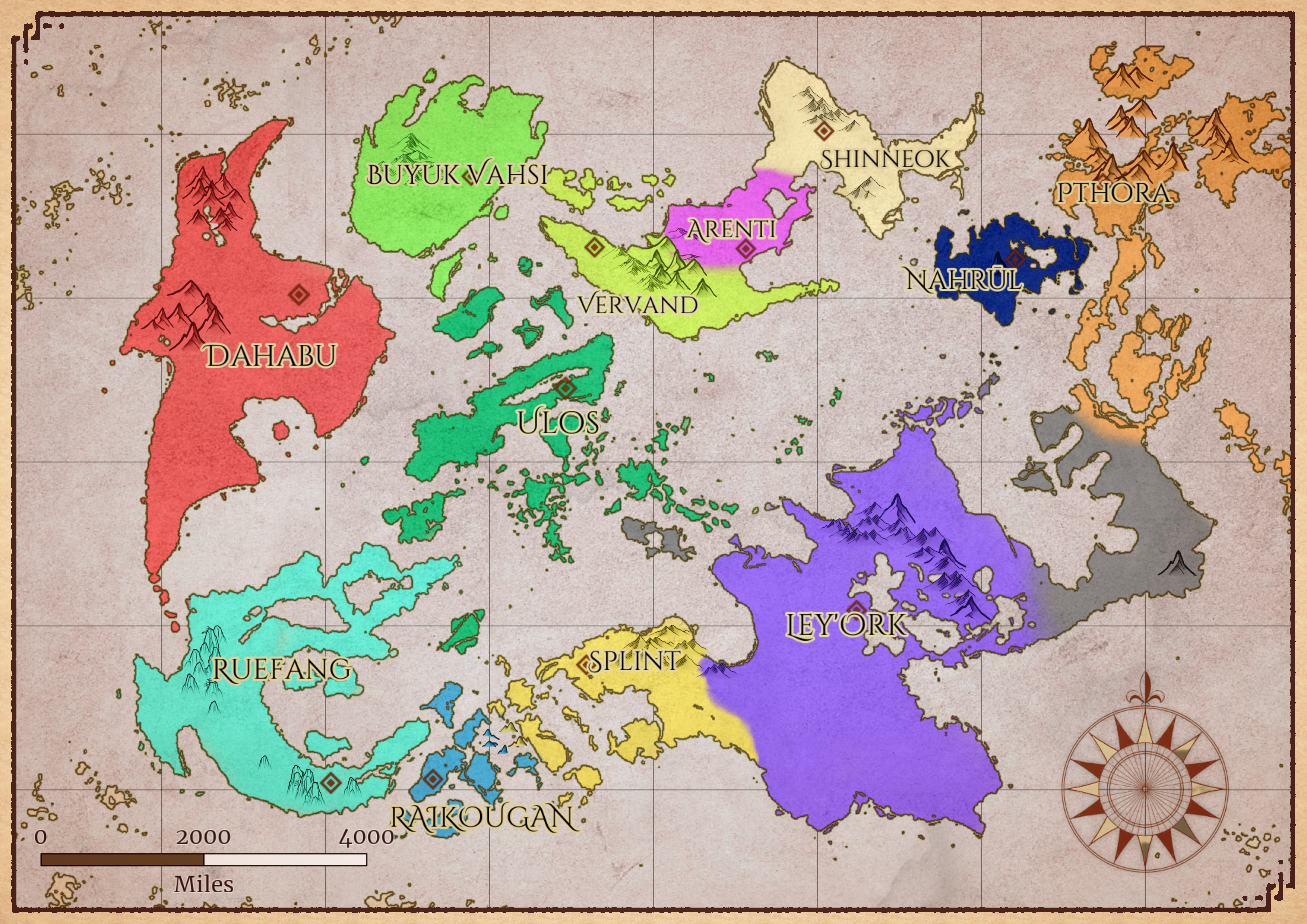Table of Contents
Cahyali
Cahyali is a sister world of Jaern, and the two planets have been inextricably linked ever since permanent contact was established in 2544. Multitudes of portals connect the worlds, and travel has become quite commonplace. Despite being an entire planet, over half of Cahyali remains unexplored, with known landmasses being limited to a single realm, called Esrior. This world's technology is somewhat more advanced than Jaern's, hovering around the real-world equivalent of the 1910s. Cahyali worships the same gods as Jaern, though many names differ and the exact method of worship varies across regions.
See the timeline of Cahyalian history here: Cahyalian Historical Timeline
Cahyali has three major continents: Esrior, Nidaior, and Akhior. Due to the magical faultline known as Esrior's Fold, the inhabitants of Esrior are unable to leave its bounds. Little is known of Nidaior or Akhior past far-flung legends of ancient war and great beasts, from human and dwarven communities. Relative to Esrior, Nidaior lies to the east, and Akhior lies to the north.
A map of Esrior. Note: this map was created by the Cahyali Historical Association and its surveyors. Regional maps may differ slightly.
Geography & Astronomy Overview
Astronomical Notes
Cahyali orbits the star Ayat.
There are three moons of Cahyali, the closest one, characterized by the large hole piercing through it and the debris that floats around it, is named Dipha, the second closest is named Leine. These two moons rise in the East and set in the West. The farthest and dimmest moon is named Fyr and rises West and sets East, in a highly elliptical orbit. Fyr has its own small potato-shaped satellite, named Myn that tumbles around in a quick elliptical orbit. Astronomers of Cahyali predict Fyr and Myn to eventually tumble out of Cahyali's gravity well in a hundred years or so. The three moons are a symbol for Seherine (At'ena). The Seherine Seers of Cahyali often use the moons and their positions as signs.
There are five total planets in the Ayat System. In order from closest to farthest from Ayat, these are Athurt, a bluish gas giant; Sthra, a greyish-blue chthonian planet; Cahyali itself; Ythern, a yellowish-red gas giant; and Pthri, a brown gas giant. Notably, Cahyali is the only rocky planet in its system. A thick belt of asteroids orbits between Cahyali and Ythern.
The map provided is aligned with magical north, as early cartographers mapped the world relative to a set of powerful leylines which were used to navigate. Polar regions lie approximately eastward. Standing on Cahyali, one would observe the sun to rise in the north and set in the south.
Geographic Features
Medius Ocean: The ocean in the middle of the realm is given this name. It is small compared to those unexplored oceans outside the Esrioran continent, and is dotted by countless small islands. This ocean seems to have an oceanic ridge in its center running east-west, slowly pushing the lands apart inch by inch over millions of years. The Medius connects Esrior to itself, and is traveled often by people from every country.
Esrior's Fold: This massive faultline rings the realm, accompanied by a host of active volcanoes in its vicinity. Due to constant storms and strong winds over the area, in addition to a disruption in the flow of magic, travel across the Fold has never been accomplished. Historians say the faultline appeared about 4,000 years ago - during the height of Imperial Dahabu - and many debate over its purpose: as a prison for Esrior, or as a guard against what lies beyond. Esriorans refer to the lands within this faultline as Esrior, or more poetically, “within the Fold”.
A political map of Cahyali. Gray areas are disputed zones.
Countries of Cahyali
The Sublime Veld
In the northwest of the world map is this area, a place of warm waters and equally warm landscapes. The civilizations here have deeply-rooted histories, documented reaching back thousands of years. Adventurers often flock to the Veld in search of ancient secrets and treasures.
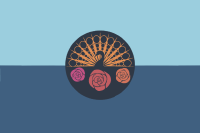 Buyuk Vahsi: Nestled in the northwest is the dual nation of Buyuk Vahsi, lush rainforest on the surface with diverse mini-climes tucked in valleys and between mountain peaks. Below the surface, though, is a vast realm of subterranean caverns with civilization as unique and robust as the flora and fauna there.
Buyuk Vahsi: Nestled in the northwest is the dual nation of Buyuk Vahsi, lush rainforest on the surface with diverse mini-climes tucked in valleys and between mountain peaks. Below the surface, though, is a vast realm of subterranean caverns with civilization as unique and robust as the flora and fauna there.
Buyuk Vahsi's population is overwhelmingly elven. They speak a dialect of Dahabi (Elvish). Its national symbol is a peacock and rose, with the peacock representing Vahsi, the surface realm; and the rose representing Buyuk, the underground realm.
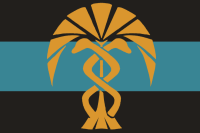 Dahabu: At the far west of the continent is Dahabu, a scorched desert nation ruled by city-states dotted across its land. Once Cahyali's greatest superpower, Dahabu is now no more than vast unknown ruins and people who, despite their harsh lives, endure against the greatest odds. It has a hot, arid desert in the south and scrublands in the north.
Dahabu: At the far west of the continent is Dahabu, a scorched desert nation ruled by city-states dotted across its land. Once Cahyali's greatest superpower, Dahabu is now no more than vast unknown ruins and people who, despite their harsh lives, endure against the greatest odds. It has a hot, arid desert in the south and scrublands in the north.
Dahabu's population is mostly elven, human, avian, and desert sandtail. Dahabi (Elvish) is the primary language, with Pthoran (Dwarvish), Ulosian (Ferric), Saedic (Paroli), and Haoog also being spoken. Its national symbol is a crescent and caduceus.
The Abundant Expanse
The Abundant Expanse, also known as the Abundance, is the southernmost region of Cahyali. This place is mostly equatorial and tropical, with rich lands and stunning natural sights. Despite not being a formal alliance, many of the countries within the Abundance are close in relation with each other, and have been for many years.
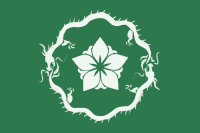 Ruefang: This nation lies upon a crescent-shaped landmass in the southwest. With dynastic and martial tradition stretching back centuries, it is currently ruled by the oligarchy of the Five-Commission Council. Ruefang has struggled with natural phenomena and strange climate caused by the country's unstable leyline system for a while, but has recently made advancements in recovering.
Ruefang: This nation lies upon a crescent-shaped landmass in the southwest. With dynastic and martial tradition stretching back centuries, it is currently ruled by the oligarchy of the Five-Commission Council. Ruefang has struggled with natural phenomena and strange climate caused by the country's unstable leyline system for a while, but has recently made advancements in recovering.
Ruefang's population consists of elves, lizards of various sorts, and some beasthide orcs. Its national language is a dialect of Dahabi (Elvish), and its national symbol is an eastern “long” dragon.
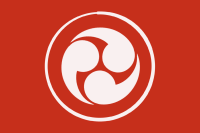 Raikougan: An archipelago nation which recently declared independence from Ruefang. Having once been part of its western neighbor, the Raikougan developed a distinct culture after being isolated for 300 years after the Fist of God. It rains near-constantly here, and the people, while kind and polite, are not to be underestimated - every one of them is trained to fight.
Raikougan: An archipelago nation which recently declared independence from Ruefang. Having once been part of its western neighbor, the Raikougan developed a distinct culture after being isolated for 300 years after the Fist of God. It rains near-constantly here, and the people, while kind and polite, are not to be underestimated - every one of them is trained to fight.
Its population is mostly lizard and avian, with some humans and elves. Its national language is a dialect of Dahabi (Elvish), and its national symbol is lightning, as well as a turtle's shell.
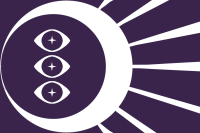 Ulos: Dotting the sea in the middle of Cahyali is a multitude of small islands. This is Ulos, a democratic nation known for its education and advancements in the arcane arts. Tropical and warm year-round, the sights of Ulos are known across the world for their stunning beauty.
Ulos: Dotting the sea in the middle of Cahyali is a multitude of small islands. This is Ulos, a democratic nation known for its education and advancements in the arcane arts. Tropical and warm year-round, the sights of Ulos are known across the world for their stunning beauty.
Its population is mainly human, halfling, avian, and semi-aquatic lizard. Ulosian (Ferric) is the national language, and the national symbol is that of three eyes in a vertical or triangular stack.
The Heartlands
This region's location around the center of Cahyali gives it its name. Much of the Heartlands is defined by Ley'Ork, as the biggest and most politically dominant country in the region. The Heartlands are mostly temperate in climate, ranging towards alpine in the Guardian Mountains and arid in the Zinapar Desert.
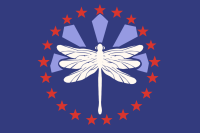 Ley'Ork: In the heart of Cahyali is Ley'Ork, the most technologically advanced nation of the continent. Fiercely capitalist and semi-democratic under the rule of the Harena Trade Union, the gears of Ley'Ork turn towards the future at any cost. Its landmass is massive, encompassing temperate forests to the north and baking desert to the south.
Ley'Ork: In the heart of Cahyali is Ley'Ork, the most technologically advanced nation of the continent. Fiercely capitalist and semi-democratic under the rule of the Harena Trade Union, the gears of Ley'Ork turn towards the future at any cost. Its landmass is massive, encompassing temperate forests to the north and baking desert to the south.
Ley'Ork's population is metropolitan; a melting pot of various races and backgrounds. Though it has no official language, many within its borders speak Saedic (Paroli). Its national symbol is a six-winged dragonfly; a creature known as the stingfly. Griffins are also considered a major Ley'Orkian symbol.
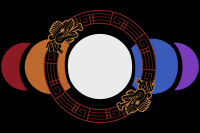 Splint: Nestled between Ley'Ork and Ruefang is the small country of Splint - which is less of a country than a hotbed of tensions between various groups, with opposing goals and ideologies save for one thing: they want Ley'Ork out of their territory. Splint is subtropical and arid in places, with stunning natural sights. About half of the country's landmass is a peninsula attached to Ley'Ork, and the other half are a group of islands bordering Ruefang's Raikougan Archipelago.
Splint: Nestled between Ley'Ork and Ruefang is the small country of Splint - which is less of a country than a hotbed of tensions between various groups, with opposing goals and ideologies save for one thing: they want Ley'Ork out of their territory. Splint is subtropical and arid in places, with stunning natural sights. About half of the country's landmass is a peninsula attached to Ley'Ork, and the other half are a group of islands bordering Ruefang's Raikougan Archipelago.
Its population is a melting pot, as many Splint residents are refugees from various places. It has no national symbol, though many take the emblem of broken chains as a sign of freedom from Ley'Ork control.
Some say that beneath Blake's Cove in the center of Splint lies a mysterious underground world...
The Oxis Alliance
In the north of Cahyali, the Oxis Alliance is the smallest region based on landmass, and is a political alliance as well as a geographical region. Its climate is mostly temperate, becoming quite a bit colder towards eastern Shinneok and being subtropical at the westernmost reaches of Vervand. The Alliance has been fraught with infighting in the past, but is peaceful in the modern day - though the encroachment of Pthora is an ever-present threat.
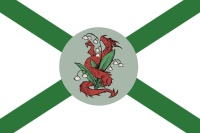 Vervand: Southernmost of the northern landmass, Vervand is the bread basket of the Oxis Alliance, with its vast farms and forests providing much food to the rest of the Alliance's constituent nations. Much of Vervand is forested, with mountainous highlands separating it from Arenti.
Vervand: Southernmost of the northern landmass, Vervand is the bread basket of the Oxis Alliance, with its vast farms and forests providing much food to the rest of the Alliance's constituent nations. Much of Vervand is forested, with mountainous highlands separating it from Arenti.
Vervand's population is mostly humans, elves, and orcs. It's national languages are Paroli (Saedic) and Geleik (Auric), though Ferric (Ulosian) is also commonly spoken. Its national symbols are a red wyrm and the lily of the valley.
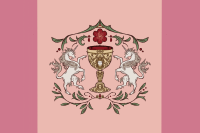 Arenti: In the middle of the Oxian subcontinent lies Arenti, known worldwide for its cultural exports. Everything from music, to painting, to photography, dance, and cuisine is well known and respected across Cahyali. Its pleasant, temperate forests and rolling plains make it a picturesque locale.
Arenti: In the middle of the Oxian subcontinent lies Arenti, known worldwide for its cultural exports. Everything from music, to painting, to photography, dance, and cuisine is well known and respected across Cahyali. Its pleasant, temperate forests and rolling plains make it a picturesque locale.
Arenti's population is mostly humans and lizards, and has some minority populations of elves and giantkin in the mountainous areas. Its national symbol is a unicorn, a relatively common magical creature in Arenti. Its national languages are particular, flowery dialects of Ferric (Ulosian) and Sel'ict.
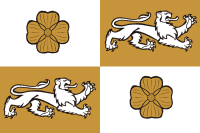 Shinneok: Northernmost of the Oxian subcontinent, Shinneok lies as a stalwart barrier between the Pale Reach and the Oxis Alliance, constantly resisting Pthoran aggression with its knightly orders. Having once ruled the entire Alliance, Shinnean culture is rather ubiquitous in Oxian territory. Their land ranges from temperate deciduous forests to coniferous, alpine regions.
Shinneok: Northernmost of the Oxian subcontinent, Shinneok lies as a stalwart barrier between the Pale Reach and the Oxis Alliance, constantly resisting Pthoran aggression with its knightly orders. Having once ruled the entire Alliance, Shinnean culture is rather ubiquitous in Oxian territory. Their land ranges from temperate deciduous forests to coniferous, alpine regions.
Shinneok's population is mostly humans, dwarves, and some orcs. Its national languages are Ferric (Ulosian) and Elvish (Dahabi). Its national symbol is a lion, despite lions no longer being extant in Oxian land.
The Pale Reach
This region is named as such because of the snow that blankets much of its land, as well as its distance from the rest of the world. Pthora is the most dominant part of this region, with Nahrul surviving and maintaining its sovereignty despite constant threat from the east. The Pale Reach is frigid and polar for the most part.
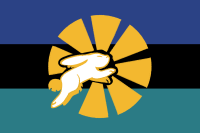 Nahrūl: A volcanic island nation just west of Pthora, Nahrūl is a theocratic country, led by Priests of the Dawn dedicated to the sun god Peregrinus. Due to its small size, Nahrūl is rather reliant on imports from other countries, and does its best to maintain good relations with the Oxis Alliance and Pthora.
Nahrūl: A volcanic island nation just west of Pthora, Nahrūl is a theocratic country, led by Priests of the Dawn dedicated to the sun god Peregrinus. Due to its small size, Nahrūl is rather reliant on imports from other countries, and does its best to maintain good relations with the Oxis Alliance and Pthora.
Nahrūl is populated by mostly dwarves, elves, and humans, along with some halflings and goblinoids. They mostly speak Pthoran and Paroli, though there is no national language. Its national symbol is a leaping rabbit, symbolizing tenacity and vitality.
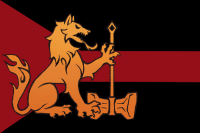 Pthora: Located in the far-eastern polar regions of the continent, Pthora has recently experienced a change in government, going from a brutal dictatorship to a democracy. The large swath of territory south of the main islands is untamable tundra that only the indigenous Johtalit people have ever successfully carved out a place for civilization in.
Pthora: Located in the far-eastern polar regions of the continent, Pthora has recently experienced a change in government, going from a brutal dictatorship to a democracy. The large swath of territory south of the main islands is untamable tundra that only the indigenous Johtalit people have ever successfully carved out a place for civilization in.
Pthora is populated by mostly dwarves, humans, and Kleemudor lizards, Pthora mainly speaks the language of Pthoran (Dwarvish). Its national symbol is a firebird.
Beyond the Continent
The Null Labyrinth: A massive underground network of cave systems, the Null Labyrinth has only a few fixed locations, with the others' locations constantly in flux. Its system of government, if one exists, is currently unknown. It is mostly populated by dark elves, duergar dwarves, elementals, and the undead. Imortuii, the tongue of the undead, seems to be the most commonly spoken language within the Labyrinth. The Null Labyrinth contains ruins of an ancient civilization known as Tarra, a subject of interest for adventurers and scholars worldwide…
People of Cahyali
The species and races inhabiting Cahyali are much the same as on Jaern, though with a few sub-divisions within them. Different species intermix and cohabitate on Cahyali, and as such a dwarf and human from the Abundance may share much more, both physically and culturally, than two humans from the Abundance and Pale Reach - for example. See the Peoples of Cahyali page for more details.
Religious tradition on Cahyali is markedly different than that of Jaern, and is much more varied. For a rundown of how Cahyalians worship, see the Religion of Cahyali page.
Factions of Cahyali
Several prominent factions, international alliances, and NGOs exist on Cahyali, all with different goals, allies, and enemies.
Please see the Factions of Cahyali page.

